Filter by
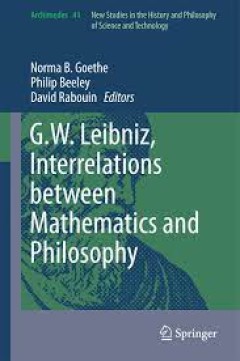
G.W. Leibniz, Interrelations between Mathematics and Philosophy
Up to now there have been scarcely any publications on Leibniz dedicated to investigating the interrelations between philosophy and mathematics in his thought. In part this is due to the previously restricted textual basis of editions such as those produced by Gerhardt. Through recent volumes of the scientific letters and mathematical papers series of the Academy Edition scholars have obtained …
- Edition
- -
- ISBN/ISSN
- 978-94-017-9664-4
- Collation
- -
- Series Title
- -
- Call Number
- -
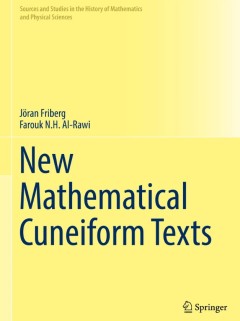
New Mathematical Cuneiform Texts
This monograph presents in great detail a large number of both unpublished and previously published Babylonian mathematical texts in the cuneiform script. It is a continuation of the work A Remarkable Collection of Babylonian Mathematical Texts (Springer 2007) written by Jöran Friberg, the leading expert on Babylonian mathematics. Focussing on the big picture, Friberg explores in this book …
- Edition
- 1
- ISBN/ISSN
- 978-3-319-44596-0
- Collation
- XVII, 553
- Series Title
- -
- Call Number
- -

Why Prove it Again? Alternative Proofs in Mathematical Practice
This monograph considers several well-known mathematical theorems and asks the question, “Why prove it again?” while examining alternative proofs. It explores the different rationales mathematicians may have for pursuing and presenting new proofs of previously established results, as well as how they judge whether two proofs of a given result are different. While a number of books have exam…
- Edition
- -
- ISBN/ISSN
- 978-3-319-17368-9
- Collation
- XI, 204
- Series Title
- -
- Call Number
- -
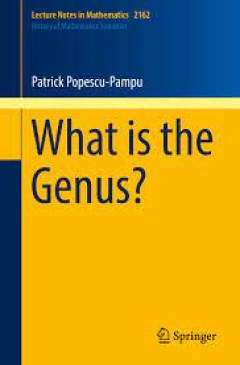
What is the Genus
Exploring several of the evolutionary branches of the mathematical notion of genus, this book traces the idea from its prehistory in problems of integration, through algebraic curves and their associated Riemann surfaces, into algebraic surfaces, and finally into higher dimensions. Its importance in analysis, algebraic geometry, number theory and topology is emphasized through many theorems. Al…
- Edition
- -
- ISBN/ISSN
- 978-3-319-42312-8
- Collation
- XVII, 184
- Series Title
- -
- Call Number
- -
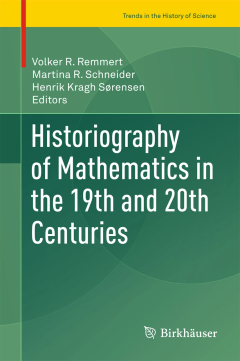
Historiography of Mathematics in the 19th and 20th Centuries
This book addresses the historiography of mathematics as it was practiced during the 19th and 20th centuries by paying special attention to the cultural contexts in which the history of mathematics was written. In the 19th century, the history of mathematics was recorded by a diverse range of people trained in various fields and driven by different motivations and aims. These backgrounds oft…
- Edition
- -
- ISBN/ISSN
- 978-3-319-39647-7
- Collation
- X, 276
- Series Title
- -
- Call Number
- 510 HIS
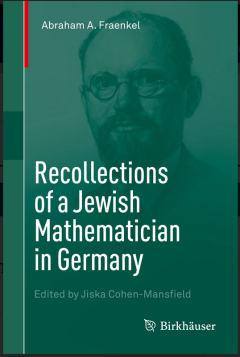
Recollections of a Jewish Mathematician in Germany
Abraham A. Fraenkel was a world-renowned mathematician in pre–Second World War Germany, whose work on set theory was fundamental to the development of modern mathematics. A friend of Albert Einstein, he knew many of the era’s acclaimed mathematicians personally. He moved to Israel (then Palestine under the British Mandate) in the early 1930s. In his autobiography Fraenkel describes his earl…
- Edition
- -
- ISBN/ISSN
- 978-3-319-30847-0
- Collation
- -
- Series Title
- -
- Call Number
- 510.9
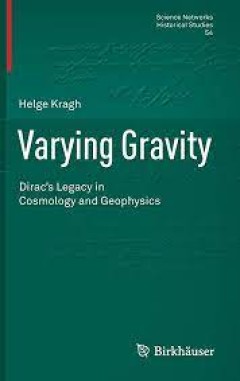
Varying Gravity Dirac’s Legacy in Cosmology and Geophysics
The main focus of this book is on the interconnection of two unorthodox scientific ideas, the varying-gravity hypothesis and the expanding-earth hypothesis. As such, it provides a fascinating insight into a nearly forgotten chapter in both the history of cosmology and the history of the earth sciences. The hypothesis that the force of gravity decreases over cosmic time was first proposed by …
- Edition
- -
- ISBN/ISSN
- 978-3-319-24379-5
- Collation
- 4 b/w illustrations, 12 illustrations in colour
- Series Title
- -
- Call Number
- -
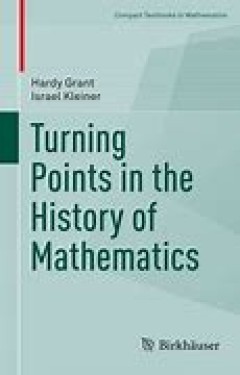
Turning Points in the History of Mathematics
This book explores some of the major turning points in the history of mathematics, ranging from ancient Greece to the present, demonstrating the drama that has often been a part of its evolution. Studying these breakthroughs, transitions, and revolutions, their stumbling-blocks and their triumphs, can help illuminate the importance of the history of mathematics for its teaching, learning, and …
- Edition
- -
- ISBN/ISSN
- 978-1-4939-3264-1
- Collation
- 38 b/w illustrations, 13 illustrations in colour
- Series Title
- -
- Call Number
- -

Turing’s Revolution The Impact of His Ideas about Computability
This book provides an overview of the confluence of ideas in Turing’s era and work and examines the impact of his work on mathematical logic and theoretical computer science. It combines contributions by well-known scientists on the history and philosophy of computability theory as well as on generalised Turing computability. By looking at the roots and at the philosophical and technical infl…
- Edition
- -
- ISBN/ISSN
- 978-3-319-22156-4
- Collation
- 17 b/w illustrations, 1 illustrations in colour
- Series Title
- -
- Call Number
- -
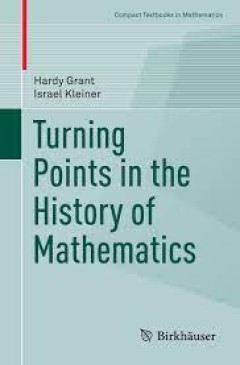
Turning Points in the History of Mathematics
This book explores some of the major turning points in the history of mathematics, ranging from ancient Greece to the present, demonstrating the drama that has often been a part of its evolution. Studying these breakthroughs, transitions, and revolutions, their stumbling-blocks and their triumphs, can help illuminate the importance of the history of mathematics for its teaching, learning, and …
- Edition
- -
- ISBN/ISSN
- 978-1-4939-3264-1
- Collation
- IX, 109
- Series Title
- -
- Call Number
- -
 Computer Science, Information & General Works
Computer Science, Information & General Works  Philosophy & Psychology
Philosophy & Psychology  Religion
Religion  Social Sciences
Social Sciences  Language
Language  Pure Science
Pure Science  Applied Sciences
Applied Sciences  Art & Recreation
Art & Recreation  Literature
Literature  History & Geography
History & Geography